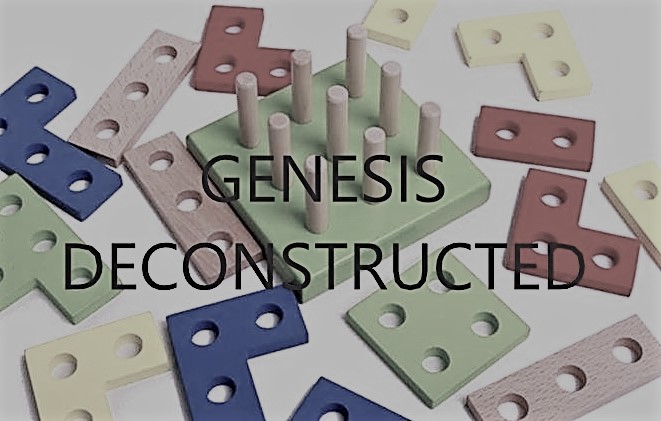Hebrew Without Vowels or Accents
The text of Genesis 1: 6 to 8 appears as follows:
Samaritan Targum Interlinear Translation
Now let’s look at the interlinear translation of Genesis 1:2 to 5 on tanakh.info:
Facts About Hebrew
We can add to our list of important facts about Hebrew:
14. In Genesis 1:6 & 7 there are three occurrences of the preposition/substantive בין , translated as ‘between’ but according to Strong’s means ‘an interval, space between’. The first occurrences of this word were in Gen 1:4, and I didn’t pick up on the full meaning so I will go back and add it to my translation.
15. In Genesis 1:6 there is another word to add to our list of common, single letter words found in the article In The Beginning, under #4. At the end of the sentence, the word ‘waters’ מים occurs twice, and the second occurrence is prefixed with the preposition ל that means ‘to, for’.
16. In Genesis 1:7 we find the conjunction אשר that according to Strong’s Concordance means ‘that, who, which’, and is mostly translated as ‘which’, or ‘who(m)’, or ‘because’.
Robert Holmstedt in his 2002 dissertation, The Relative Clause in Biblical Hebrew: A Linguistic Analysis states that the relative clause modifies the noun ‘the waters’, “distinguishing between those waters that were above and below the dividing element, the firmament” p 115. Holmstedt translates אשר as ‘that were’ in both occurrences in Gen 1:7, emphasizing the separation aspect, supporting that the waters above are different from the waters below. This nuance is captured in some Bible translations as ‘that were’ (ESV) or ‘which were’ (NASB, and KJB), but not all Bible translations (NIV, NLT, and Berean Study Bible).
17. In Genesis 1:7 we find a new adjective/adverb כן (Strong’s 3651) that according to Strong’s means ‘so, thus’, but according to Brown-Driver-Briggs, as an adjective means ‘right, veritable, honest’, as an adverb means ‘so’. It doesn’t seem to affect the meaning of this verse, whether it ends with ‘and be so’ or ‘and be right’.
Constructing The Sentences
Let’s construct the sentences – subject, verb, object, like we did for previous verses:
Gen 1:6 has two major clauses. In the first clause, the subject is ‘gods’, the verb ‘said’, the object is what they said, ‘let there be a firmament in the midst of the waters and let it separation space between the waters and the waters’. Within the object are two subclauses, the subject of both is ‘gods’ from the first clause, in the first subclause the verb is ‘be’, and the object ‘a firmament in the midst of the waters’, and the second subclause the verb is ‘and be’, and the object ‘separation space between waters for waters’.
Gen 1:7 has two major clauses. In the first clause, the subject is ‘gods’, the verb ‘made’, the et את indicates that ‘the firmament’ is a direct object of ‘gods made’. In the second clause, the subject is ‘gods’ from the first clause, the verb ‘separate/d’, and the object ‘space between the waters that were under the firmament and the waters that were above the firmament’, emphasized by the subordinate clause ‘and be so’.
Gen 1:8 has two major clauses. In the first clause, the subject is ‘gods’, the verb ‘called’, the object is ‘to firmament sky’. In the second clause, the subject is the ‘second day’, the verb ‘be’, and the object ‘evening’, and a sub clause with the verb ‘be’, and object ‘morning’.
Literal and Figurative Translation
Finally, we can translate all the sentences in this paragraph:
And say gods ‘let there be firmament in the midst of the waters and be separating space between waters to waters. So make gods the firmament and separating space between the waters which were under to firmament and space between the waters which were above the firmament, and be so. And call gods to firmament ‘sky’ and be evening and be morning second day.
Analysis
Looking at what has transpired so far, there is clearly a major theme of separation. Analyzing how this unfolded, we see that, at the start, gods ‘created’ the heavens and the earth’ in Gen 1:1, and the earth became formless/waste and void/empty, and darkness over face of deep/abyss and spirit of gods hovering over face of waters in Gen 1:2. The cause of the earth becoming ‘formless and void’ was the change in Satan from a perfect creation to unrighteous and was cast from the mountain of God as described in Ezek 28: 12 – 16.
Gods said ‘let there be light and be light’ Gen 1:3, and the light was separated from the darkness on day one Gen 1:4 & 5. God’s said ‘let there be firmament in the midst of the waters be separation space between waters to waters’, and ‘made gods the firmament’, and called to firmament ‘sky’ on the second day in Gen 1: 6 – 8. Gods making, as opposed to creating, or speaking into existence appear to reflect a change to the creation due to corruption, hence the separation space between the waters above and below.
The figurative meaning of ‘waters’ in Genesis is similar to Revelation, where waters from God (those above) are said to be the source of life Rev 7:17 & 21:2, and those on the earth are ‘peoples and multitudes and nations and tongues’ Rev 17:15. The ‘deep/abyss’ can also mean ‘sea’, a large body of water, representing Satan and his angels, who are also separated from God by the firmament. The ‘deep’ causes trees to grow lofty, its roots extend to many waters, and its heart haughty in its loftiness, as Assyria, a cedar in Lebanon, which appears to be referring to Adam, who is outside God’s garden Ezekiel 31: 1 to 10.
In my next article, I will look at Genesis 1: 9 to 13.
